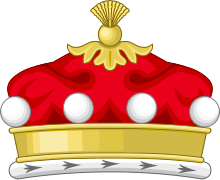|
Joseph Bailey, 2nd Baron GlanuskJoseph Henry Russell Bailey, 2nd Baron Glanusk, CB, CBE, DSO (26 October 1864 – 11 January 1928), was a British Army officer and peer. Early lifeBailey was the eldest son of Sir Joseph Bailey, 2nd Baronet, who was created Baron Glanusk in 1899. He succeeded his father in both titles in 1906.[1] Military careerOn 7 February 1885, Bailey was commissioned as a lieutenant in the Grenadier Guards from the Royal Military College, Sandhurst, and he was promoted captain on 11 November 1896.[2] After the outbreak of the Second Boer War in October 1899, a corps of imperial volunteers from London was formed in late December 1899. The corps included infantry, mounted infantry and artillery divisions and was authorized with the name City of London Imperial Volunteers. It proceeded to South Africa in January 1900, returned in October the same year, and was disbanded in December 1900. Captain Bailey was appointed as Adjutant to the infantry division on 3 January 1900, with the temporary rank of Major in the Army,[3] and served as such until the corps was disbanded. He was promoted to the substantive rank of major on 29 November 1900, and awarded a Distinguished Service Order (DSO) for his services in South Africa later the same year.[1][4] After his return to the United Kingdom, he was on 1 June 1901 appointed to command the Guards' depot at Caterham, Surrey.[5] He retired from the Grenadier Guards in 1903, and became Lieutenant-Colonel commanding the part-time 3rd (Royal South Wales Borderers Militia) Battalion, South Wales Borderers, on 9 April 1904.[6] After he succeeded to the barony, he was also appointed to succeed his father as Honorary Colonel of the 1st (Brecknockshire) Volunteer Battalion, South Wales Borderers, on 1 June 1907.[1][6] In a most unusual arrangement, he was later appointed the active commanding officer of the battalion (now the Brecknockshire Battalion in the Territorial Force) on 20 March 1912. On the outbreak of World War I he mobilised the battalion at Brecon and commanded it when it was deployed to Aden in December 1914.[6][7][8] Having been appointed a CB in 1911, he was also made a CBE in 1919 at the end of the war.[1][6][7] Other rolesHe was appointed a deputy lieutenant of Breconshire in March 1887,[9] and succeeded his father in the appointment as Lord Lieutenant of Breconshire in 1905, a post he held until his death.[1] FamilyBailey married, in 1890, Editha Elma Sergison, daughter of Major Warden Sergison, and they had the following children:[1]
Lord Glanusk died in January 1928, aged 63, leaving the ancestral home, Glanusk Park, and his titles to his son, Wilfred Bailey, 3rd Baron Glanusk. Lady Glanusk died in 1938.[1] Coat of arms
References
Sources
|
